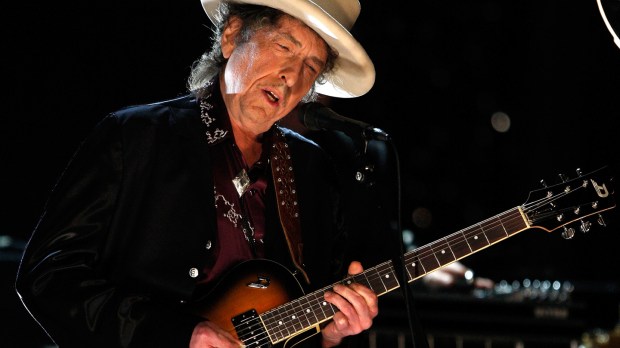Bob Dylan, the first songwriter to receive the Nobel Literature Prize, delivered his Nobel lecture, fulfilling the requirement to claim the eight million kronor ($923,000) prize.
The lecture, which is available as an audio link on the Nobel Academy’s website, is read aloud by Dylan, who reflects on the links between his music and literature.
“When I first received this Nobel Prize for Literature, I got to wondering exactly how my songs related to literature,” Dylan said.
In the speech he names as musical influences Buddy Holly (like an older brother) and Lead Belly (the record “Cotton Fields” changed his life and introduced him to a different more “vibrant” kind of music than the music he grew up with).
Dylan also credits the books he read as a child for his success as a song writer.
“I had something else as well. I had principles and sensibilities and an informed view of the world. And I had had that for a while. I learned it all in grammar school,” he says.
“Don Quixote, Ivanhoe, Robinson Crusoe, Gulliver’s Travels, Tale of Two Cities, and all the rest. Typical grammar school reading. They gave you a way of looking at life an understanding of human nature and a standard to measure things by. I took all that with me when I started composing lyrics, and the themes from those books worked their way into the lyrics either knowingly or unintentionally.”
He then talks about three classic novels that had a particular influence on him, Moby Dick, All Quiet on the Western Front and The Odyssey, in a manner reminiscent of the poetic cadence of the his songs.
Dylan concludes the lecture with his thoughts on the differences between music and literature:
Our songs are alive in the land of the living. But songs are unlike literature. They’re meant to be sung, not read. The words in Shakespeare’s plays were meant to be acted on the stage. Just as lyrics in songs are meant to be sung, not read on a page. And I hope some of you get the chance to listen to these lyrics the way they were intended to be heard: in concert or on record or however people are listening to songs these days. I return once again to Homer, who says, “Sing in me, oh Muse, and through me tell the story.”
The entire speech can be heard here.

